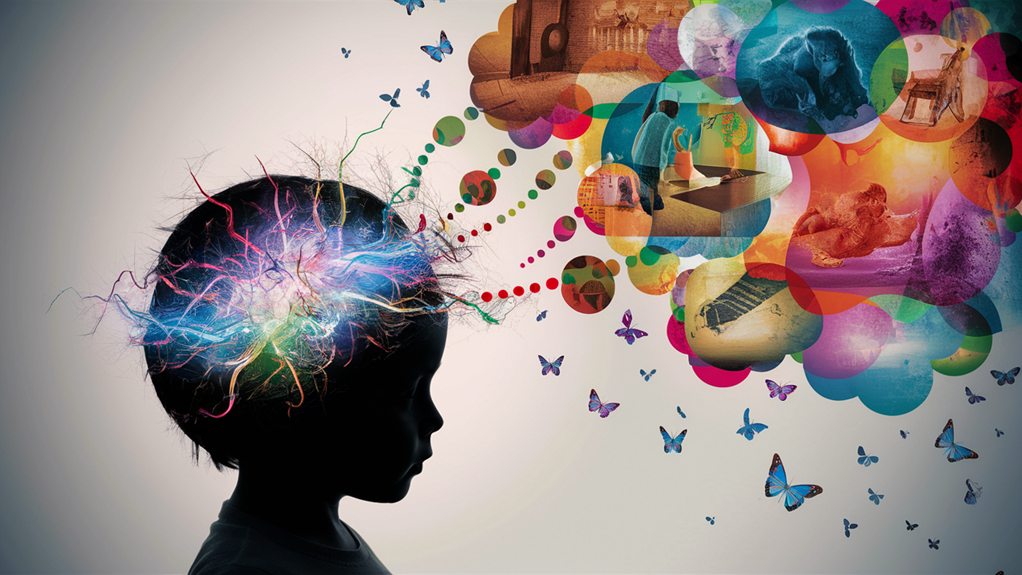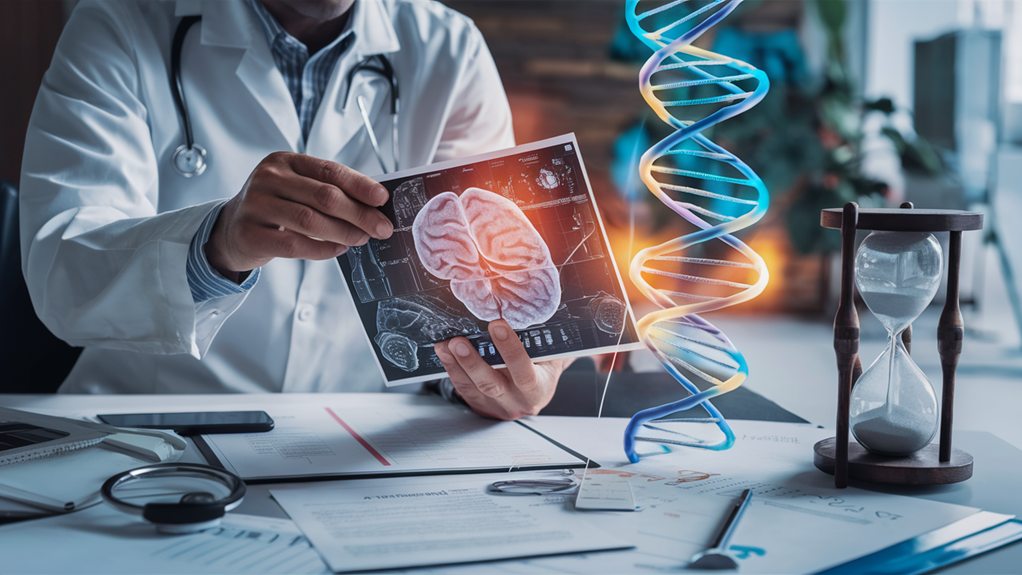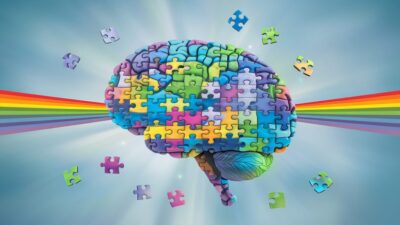ADHD is a neurodevelopmental condition that affects your ability to focus, control impulses, and manage daily tasks effectively. You might find yourself struggling with staying organized, following instructions, or completing assignments on time. While symptoms typically appear before age twelve, ADHD can persist into adulthood, impacting your work, relationships, and overall quality of life. The good news is that with proper diagnosis and treatment, which often includes a combination of medication and behavioral therapy, you can develop effective strategies to manage your symptoms. Support systems, digital tools, and lifestyle modifications can help you create a path toward success and better daily functioning.
What Is ADHD

Complexity surrounds Attention-Deficit/Hyperactivity Disorder (ADHD), a common neurodevelopmental condition that affects both children and adults. When you're dealing with ADHD, your brain processes information differently, which can affect your ability to focus, control impulses, and manage daily tasks.
ADHD symptoms often appear in childhood, though they can persist into adulthood. You'll notice that children with ADHD might struggle to sit still during class, have trouble following instructions, or become easily distracted by their surroundings. These challenges can affect their schoolwork, relationships, and daily activities.
Adult ADHD presents similarly but may look different in your day-to-day life. You might find yourself forgetting important meetings, struggling to organize tasks, or having difficulty maintaining focus during conversations.
It's important to understand that ADHD isn't about intelligence or capability – it's about how your brain manages attention and activity levels. While everyone occasionally experiences focus issues or restlessness, people with ADHD face these challenges consistently and intensely enough to impact their daily functioning, relationships, and overall quality of life.
Common Signs and Symptoms
Recognizing ADHD involves understanding its distinct patterns of behavior and thought processes. When you're looking for signs of ADHD in children, you'll notice three main categories of symptoms: inattention, hyperactivity, and impulsivity. These symptoms often appear before age twelve and can greatly impact daily life.
You might observe that someone with ADHD frequently loses focus during conversations, struggles to complete tasks, or often misplaces important items.
In children, you'll notice they might've trouble sitting still during class, constantly fidget with objects, or interrupt others while they're speaking.
Before considering ADHD treatment, it's important to recognize that these behaviors must be persistent and occur in multiple settings, such as both home and school.
ADHD management strategies often begin with identifying specific challenges, like difficulty with organization or time management. You might notice that tasks requiring sustained mental effort are particularly challenging, and there's often a tendency to postpone important activities.
Diagnosis Process

Medical professionals follow a thorough evaluation process to diagnose ADHD, as no single test can confirm the condition. Your doctor will start by gathering a detailed medical history, including your family's health background and any significant life events that might affect your behavior.
During your evaluation, you'll undergo an extensive assessment that typically includes several components. Your doctor will review your symptoms, both past and present, and may ask you to complete standardized behavior rating scales.
They'll also want to speak with your family members, teachers, or other people who know you well to understand how your symptoms show up in different settings.
You might need to complete psychological tests that measure attention span, impulsivity, and other cognitive functions. Your doctor will also perform a physical exam to rule out other medical conditions that could cause similar symptoms.
Throughout this process, they'll compare your symptoms to specific criteria in the DSM-5, the diagnostic manual used by mental health professionals. If you're a child, your doctor may observe your behavior in different settings, like at school or during the evaluation itself.
Treatment Options
Once you've received an ADHD diagnosis, your doctor will work with you to develop an effective treatment plan. Most treatment approaches combine medication with behavioral therapy, creating a thorough strategy that addresses both the biological and practical aspects of ADHD.
Medications, particularly stimulants, are believed to help increase the levels of certain neurotransmitters in the brain, similar to how understanding antidepressants explains their role in treating mood disorders. If medication is recommended, you'll likely start with stimulants like Adderall or Ritalin, which help improve focus and reduce impulsivity. Your doctor might also suggest non-stimulant medications, such as Strattera, if stimulants aren't the right fit for you. You'll work together to find the right medication and dosage through careful monitoring and adjustments.
Behavioral therapy teaches you practical skills to manage ADHD symptoms, including organization techniques, time management strategies, and ways to break tasks into manageable steps.
You might also benefit from cognitive behavioral therapy (CBT), which helps you recognize and change negative thought patterns. Many people find that lifestyle modifications, such as creating structured routines, using reminder systems, and maintaining regular exercise habits, can greatly improve their symptoms when combined with other treatments.
Living With ADHD

Daily life with ADHD presents unique challenges, but you can thrive by implementing effective coping strategies. Establishing a strong support network can play an essential role in managing your anxiety and enhancing your ability to cope.
You'll find success by breaking tasks into smaller, manageable chunks and using tools like calendars, reminders, and to-do lists to stay organized. Setting up a consistent daily routine can help you maintain focus and reduce stress throughout your day.
At work or school, you can adapt your environment to minimize distractions by choosing quieter spaces, using noise-canceling headphones, or requesting accommodations when needed. It's important to recognize your peak productivity hours and schedule demanding tasks during these times.
You'll also benefit from regular exercise, proper sleep habits, and a healthy diet, which can greatly improve your ability to concentrate.
Don't hesitate to communicate your needs to family, friends, and colleagues who can provide support and understanding. Remember that everyone's ADHD experience is different, so you might need to try various strategies before finding what works best for you.
With patience and persistence, you'll develop a personalized toolkit of techniques that help you manage your symptoms effectively.
Impact on Daily Life
Living with ADHD affects nearly every aspect of your daily activities, from managing time to maintaining relationships. You'll often find yourself struggling to stay focused during important tasks, missing deadlines, or forgetting essential appointments. Simple activities, like following a morning routine or keeping your workspace organized, can feel overwhelming and challenging.
At work or school, you might notice that you're easily distracted by background noises, conversations, or even your own thoughts. Tasks that require sustained attention, like reading lengthy documents or sitting through meetings, can be particularly demanding.
You're likely to experience difficulties with prioritizing assignments, following multi-step instructions, and completing projects on time.
In your personal life, ADHD can impact how you interact with family and friends. You might interrupt conversations without meaning to, forget important dates, or struggle to maintain long-term friendships.
Managing household responsibilities, such as paying bills on time or keeping up with home maintenance, can also become complicated when ADHD symptoms interfere with your executive functioning skills and organizational abilities.
Support and Resources

Support systems play a significant role in managing ADHD effectively. In recent years, there have been global initiatives aimed at improving mental health awareness that underscore the importance of community support and access to resources.
You'll find that having the right resources and people in your corner can make a tremendous difference in your journey. Your support network might include family members, teachers, mental health professionals, and ADHD coaches, who can all work together to help you develop effective coping strategies.
There's a wealth of resources you'll want to explore, including local ADHD support groups, online communities, and educational materials. You can connect with organizations like CHADD (Children and Adults with ADHD) or ADDA (Attention Deficit Disorder Association), which offer valuable information, workshops, and networking opportunities.
Many schools provide learning accommodations, such as extended test time or quiet study spaces, and you shouldn't hesitate to discuss these options with your teachers or counselors.
Digital tools and apps can also enhance your daily routine, helping you with time management, organization, and task completion. You'll find medication tracking apps, calendar systems, and reminder tools that are specifically designed for people with ADHD.
Strategies for Success
Successful management of ADHD requires a personalized toolkit of proven strategies and techniques. Incorporating foods that support adrenal function can enhance your energy levels and improve stress resilience, which is vital for individuals with ADHD foods for stress resilience.
You'll find that breaking tasks into smaller, manageable chunks helps prevent feeling overwhelmed, while using timers and alarms can keep you on track throughout the day. Creating a structured environment, with designated spaces for important items and a clear daily routine, will help minimize distractions and boost productivity.
To strengthen your focus, you'll want to implement the "two-minute rule," which means tackling quick tasks immediately rather than putting them off. Using color-coding systems, planners, and digital tools can help you stay organized, while setting up regular study or work intervals with short breaks will maintain your concentration.
It's also essential to minimize distractions by finding a quiet workspace, using noise-canceling headphones, or trying white noise when needed.
Remember to prioritize self-care by getting enough sleep, exercising regularly, and maintaining a healthy diet. You might also benefit from using fidget tools or stress balls during tasks that require extended focus, as these can help channel excess energy constructively.



